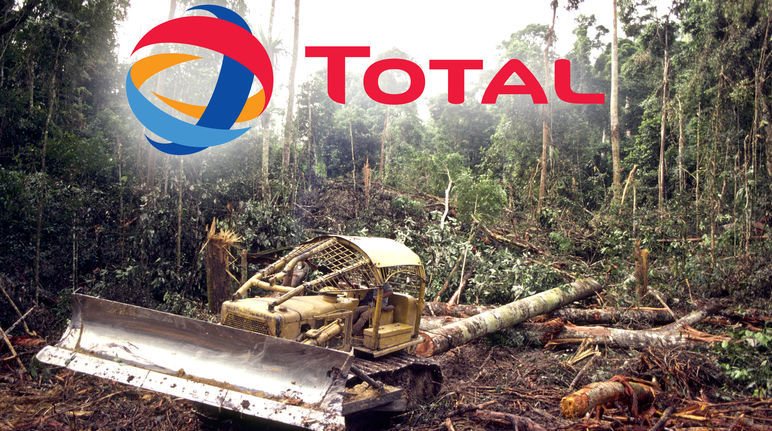Trashing rainforest for biofuel? A TOTAL disaster!
 Rainforests are being destroyed for “green” palm oil-based biofuels (© collage RdR/istockphoto)
Rainforests are being destroyed for “green” palm oil-based biofuels (© collage RdR/istockphoto)
French oil multinational Total is stepping up its reliance on palm oil and wants to build a “biorefinery” in Marseilles to meet allegedly growing demand for diesel fuel – and this in spite of the European Parliament’s call for biofuels from palm oil to be phased out. Please speak out against Total’s misguided plans.
News and updates Call to actionTo: Patrick Pouyanné, Chairman and CEO of Total; relevant policymakers in France and the EU
“Total must drop its plans to build a biofuel refinery. The production of palm oil for biofuels is a serious threat to the world’s rainforests.”
Total intends to invest €275 million to convert a fossil oil refinery in the port of La Mède near Marseilles to a “biorefinery”. The oil multinational hopes to give its business a boost by producing half a million tons of hydrotreated vegetable oil from palm oil and waste materials annually.
French environmentalists and labor representatives are sounding the alarm over Total’s plans. Rainforests are being cleared, people driven from their land and human rights trampled to make way for oil palm plantations.
Total’s La Mède refinery will need 650,000 tons of vegetable oil, consisting of 100,000 of used cooking oil, 100,000 tons of palm oil derivatives and 450,000 tons of raw palm oil. According to Mireille Villion of the French NGO Amis de la Terre, that is more than twice the total amount of palm oil currently being consumed in France.
TOTAL justifies the construction of the plant with increasing biofuel and diesel consumption, draft legislation in France and the EU’s Renewable Energy Directive.
The EU, however, has since moved on: An overwhelming majority across all parties in the European Parliament has called for an end to the use of palm oil and other vegetable oils in biofuels. The motion by the MEPs recommends phasing out the use of vegetable oils for biofuels by 2020.
The European Parliament, the Council of the European Union and Member States are currently negotiating a new version of the Renewable Energy Directive based on a Commission proposal from November 2016 (proposal and annexes).
Please speak out against Total’s misguided “biorefinery” plans. Hydrotreated vegetable oil is not a “green” biofuel!
BackgroundHydrotreated vegetable oil
Hydrotreated vegetable oil (HVO) is chemically similar to fossil diesel fuel, and unlike conventional biodiesel, it can be blended with fossil diesel in any desired proportion. Producing half a million tons of hydrotreated biodiesel as Total plans would require around 650,000 tons of vegetable oils or animal fats.
The global market leader for hydrotreated vegetable oil is the Finnish Neste Group with a yearly capacity of 2.4 million tons (with four plants in Amsterdam, Singapore and Porvoo), followed by the Italian Eni Group (in Marghera near Venice and Gela in Sicily). Neste and Eni also use palm oil and other palm oil industry products such as palm oil fatty acid distillates (PFADs) to produce HVO biofuels.
According to industry analysts, further oil companies such as Spain’s CEPSA (wholly owned by a holding company in Dubai) and REPSOL, Portugal’s GALP, Sweden’s Preem and Ireland’s ConocoPhillips are also producing hydrotreated vegetable oil in existing fossil oil refineries. In the production method known as co-processing, refined vegetable oils are processed together with fossil diesel fuel. The result is a mixture of fossil diesel and HVO fuel (Co-HVO).
Biofuel from recycled oils and fats
TOTAL writes that its biofuel would be produced mainly from used vegetable oils and fats. Total does not say where it plans to obtain the huge volumes of waste vegetable oil and animal fats that this would require. Instead, the company appears to intend to use palm oil, delivered by tankers to the harbor, for the bulk of the refinery’s raw material.
In 2016, Total signed an agreement with Suez to supply 20,000 tons of used edible oils and fats annually. About 45,000 tons are currently being collected throughout France. According to Total, a maximum of 100,000 tons per year would be available. Greenea, a specialized French trader in waste materials for the biofuel industry, estimates the potential quantity of used edible oils that could be collected from French households to be 50,000 tons per year. The company also writes of a world market shortage of used deep-frying oils and other waste products suitable for the production of biofuels.
According to the French environmental organization Amis de la Terre, Total also plans to process 100,000 tons of palm oil derivatives in La Mède. This presumably will include palm fatty acid distillate (PFAD), which is also used by the Finnish Neste Group. On its website, Neste argues that PFAD should be considered a “processing residue” to be used for the production of “advanced biofuel”. Under the heading “Advanced biofuels, our future today”, Neste writes that “waste and residues make up more than half of renewable raw material usage”.
This raises the question, however, of whether PFAD and similar products should be considered to be waste or residues. According to an analysis, PFAD amounts to around five percent of total palm oil production, or around three million tons a year worldwide. The market value of PFAD is around 85 percent of the price of refined palm oil. It is used by the chemical industry and for the production of cattle feed and soaps.
Why is the oil industry investing in HVO biofuels?
Greenea analysts give the following reasons as to why major oil companies are investing in HVO biofuels: HVO biofuel has a higher quality than the standard for biodiesel specified in EN14214. The high quality of HVO can be fully attained using the cheapest of raw materials such as palm oil, PFAD or high-FFA animal fat from the meat-packing industry. Unlike conventional biodiesel (fatty acid methyl ester, FAME), HVO fuel is suitable for use at low temperatures – even under arctic conditions – and in aircraft as a substitute for conventional jet fuel. By contrast, conventional biodiesel must contain at least a 50 percent share of higher-quality and more expensive vegetable oils such as rapeseed in order to comply with EU standards. Palm oil thus gives HVO manufacturers a competitive edge.
The oil industry also has to cope with refinery overcapacity due to falling or stagnating demand. Plant closures can be prevented and jobs saved by converting conventional refineries that are no longer profitable to HVO refineries.
Greenea also states that HVO producers are improving the carbon footprint of their fuel by using waste such as used frying oils and animal fats. As lobbying against palm oil is gaining strength in Europe, HVO manufacturers have been seeking ways to make their production appear sustainable.
The biofuel industry is also suffering from falling demand. Many manufacturers have had to shut down plants and are struggling with economic challenges. The French Avril Group – Europe’s largest biofuel producer – has already had to close two refineries (Cappelle-la-Grande and Venette) in 2013.
The EU Renewable Energy Directive
The European Parliament, the Council of the European Union and Member States are currently negotiating an update of the Renewable Energy Directive. The directive governs the biofuels policy of the European Union. The basis for the negotiations is a Commission proposal from November 2016 (proposal and annexes). A European Parliament resolution on April 4, 2017 calls for biofuels based on vegetable oils to be phased out by 2020.
Total
The French Total Group is one of the world's largest oil multinationals and is present in more than 130 countries. At the end of last year, its consolidated reporting scope comprised 934 companies. Total extracts 2.5 million barrels of oil equivalent per day in Europe, Africa, the Middle East, Asia and the Americas. The group operates a total of 9,154 service stations in Europe, 4,217 in Africa, 1,372 in Southeast Asia, 816 in the Middle East and 864 in the Americas under the brand names Total, Total Access, Elan, AS24 and TotalErg.
Sources:
Total: La Mède: Total’s first biorefinery
Total: Suez and Total partner to recycle cooking oil into biofuel
La Provence: Total et l'huile de palme :des associations dénoncent
Greenea: Is HVO the Holy Grail of the world biodiesel market?
Greenea: New players join the HVO game
To: Patrick Pouyanné, Chairman and CEO of Total; relevant policymakers in France and the EU
Dear Mr. Pouyanné, Ladies and Gentlemen,
We call on you to cancel Total’s plans to build a biofuel refinery for vegetable oils such as palm oil in La Mède near Marseille.
All biofuels based on vegetable oil – and palm oil in particular – have a negative climate impact, as the GLOBIOM study produced on behalf of the European Commission states.
Rainforests are being cleared, people driven from their land and human rights trampled to make way for oil palm plantations.
An overwhelming majority of all parties in the European Parliament has called for an end to biofuels from palm oil and other vegetable oils. A motion by the MEPs recommends phasing out the use of vegetable oils for biofuels by 2020.
Yours faithfully,
The issue – rainforest on our dinner tables and in our fuel tanks
At 66 million tons annually, palm oil is the most commonly produced vegetable oil. Its low world market price and properties that lend themselves to processed foods have led the food industry to use it in half of all supermarket products. Palm oil can be found in frozen pizzas, biscuits and margarine, as well as body creams, soaps, makeup, candles and detergents.
Few people realize that almost half of the palm oil imported into the EU is used as biofuel. Since 2009, the mandatory blending of biofuels into motor vehicle fuels has been a major cause of deforestation.
Oil palm plantations currently cover more than 27 million hectares of the Earth’s surface. Forests and human settlements have been destroyed and replaced by “green deserts” containing virtually no biodiversity on an area the size of New Zealand.
The impact – suffering and death in producer countries, climate havoc
The warm, humid climate of the tropics offers perfect growth conditions for oil palms. Day after day, huge tracts of rainforest in Southeast Asia, Latin America and Africa are being bulldozed or torched to make room for more plantations, releasing vast amounts of carbon into the atmosphere. As a consequence, Indonesia – the world’s largest producer of palm oil – temporarily surpassed the United States in terms of greenhouse gas emissions in 2015. With their CO2 and methane emissions, palm oil-based biofuels actually have three times the climate impact of traditional fossil fuels.
Palm oil is not only bad for the climate: As their forest habitat is cleared, endangered species such as the orangutan, Borneo elephant and Sumatran tiger are being pushed closer to extinction. Smallholders and indigenous people who have inhabited and protected the forest for generations are often brutally driven from their land. In Indonesia, more than 700 land conflicts are related to the palm oil industry. Human rights violations are everyday occurrences, even on supposedly “sustainable” and “organic” plantations.
As consumers, we are largely unaware of these broader issues, yet our daily palm oil consumption also impacts our health: refined palm oil contains large amounts of harmful fatty acid esters that are known to damage DNA and cause cancer.
The solution – a revolution on our dinner tables and in our fuel tanks
Only 70,000 orangutans still roam the forests of Southeast Asia, yet the EU’s biofuels policy is pushing them to the brink of extinction. Every new plantation on Borneo is destroying a further piece of their habitat. Stepping up the pressure on policymakers is a must if we want to save our tree-dwelling kin. Apart from that, however, there is still a lot we can do in day-to-day life.
Follow these simple tips to recognize, avoid and combat palm oil:
- Enjoy a home-cooked meal: Use your imagination: why not try almond-coconut-pear biscuits? Or pizza with potato and rosemary? A meal cooked from fresh ingredients beats processed foods containing palm oil every time. Oils such as sunflower, olive, rapeseed or flaxseed are ideal for cooking and baking.
- Read labels: As of December 2014, labeling regulations in the EU require food products to clearly indicate that they contain palm oil. However, in the case of non-food items such as cosmetics and cleaning products, a wide range of chemical names may still be used to hide the use of palm oil. A quick check of your favorite search engine will turn up palm oil-free alternatives, however.
- Remember that the customer is king: Ask your retailers for palm oil-free products. Write product manufacturers and ask them why they aren’t using domestic oils. Companies can be quite sensitive to issues that give their products a bad name, so inquiring with sales staff and contacting manufacturers can make a real difference. Public pressure and increased awareness of the problem have already prompted some producers to stop using palm oil.
- Sign petitions and write your elected representatives: Online campaigns put pressure on policymakers responsible for biofuels and palm oil imports. Have you already signed all of Rainforest Rescue’s petitions?
- Speak out: Protest marches and creative action on the street raise public and media awareness of the issue, which in turn steps up the pressure on policymakers.
- Leave your car at home: Whenever you can, walk, ride a bicycle or use public transport.
- Be informed and inform others: Big Business and governments would like us to believe that biofuels are good for the climate and that oil palm plantations are sustainable. Spread the word – share this information with your family and friends and encourage them to rethink their consumption habits. It’s in our hands!














 Recent successes
Recent successes